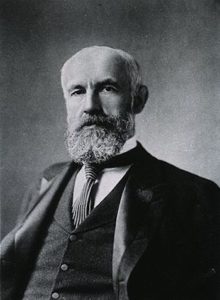
Granville Hall
*Granville Hall was born on this date in 1846. He was a white-American psychologist, racial eugenics theorist, and educator. Born in Ashfield, Massachusetts, Granville Stanley Hall grew up on a farm with his parents, Granville Bascom Hall, who served in the Massachusetts legislature, and Abigail Beals, who attended Albany Female Seminary and became a teacher.
As a child, he spent much of his time reading and taking advantage of the educational benefits he could gain from his parents and the local schools. At a young age, Hall was interested in animals and physical skills. At the age of 16, he began to teach.
Hall's first wife was Cornelia Fisher. They were married in September 1879 and produced two children. In 1890, Cornelia and their daughter, Julia Fisher Hall, died of accidental asphyxiation. Their son, Dr. Robert Granville Hall, was raised by his father. His second marriage was to Florence E Smith in July 1899. His second wife had "arteriosclerosis of the brain" and was institutionalized after years of eccentric behaviors.
Hall attended Williston Seminary, graduated from Williams College in 1867, and then studied at the Union Theological Seminary. Hall pursued doctoral studies at Harvard University, where he met William James, an adjunct professor who had just taught the nation's first psychology class. In 1878, Hall earned the first psychology doctorate awarded in America. After Hall graduated, he went to Europe to study at the University of Berlin and Wundt's Leipzig laboratory in 1879. He taught English and philosophy at Antioch College in Yellow Springs, Ohio, and then taught history of philosophy at Williams College in Massachusetts. Hall secured a position in the philosophy department at Johns Hopkins, teaching psychology and pedagogy, from 1882 to 1888.
In 1883, what is considered by some to be the first formal American psychology laboratory began. Hall was elected a member of the American Antiquarian Society in 1888. Darwin's theory of evolution and Ernst Haeckel's recapitulation theory greatly influenced Hall's career. These ideas prompted Hall to examine aspects of childhood development to learn about the inheritance of behavior. The subjective character of these studies made their validation impossible. He believed that as children develop, their mental capabilities resemble those of their ancestors, so they develop the same way species evolve over a lifetime. Hall believed that recapitulation could be sped up through education and force children to reach modern standards of mental capabilities more quickly.
His work also delved into controversial portrayals of the differences between women and men and the concept of racial eugenics. While Hall was a proponent of racial eugenics, his views believed in giving "lower races" a chance to accept and adapt to "superior civilization." Hall even commended high-ranking Blacks in society as being "exception to the Negro's diminished evolutionary inheritance." Hall similarly viewed civilization; he viewed biological development. Humans must allow civilization to "run its natural evolution."
Hall saw those who did not accept the superior civilization as primitive "savages ." Hall similarly viewed these civilizations as he viewed children, stating that "their faults and their virtues are those of childhood and youth ." Hall believed that men and women should be separated into their schools during puberty because it allowed them to grow within their gender. Women could be educated with motherhood in mind, and men could be educated in more hands-on projects, helping them become home leaders.
Hall believed that schools with both sexes limited the way they could learn and softened the boys earlier than they should. "It is a period of equilibrium, but with the onset of puberty, the equilibrium is disturbed, and new tendencies arise. Modifications in the reproductive organs take place and bring about secondary sexual characteristics. Extroversion gives way to introversion, and social instincts play an increasing role." Hall had Victorian moral positions in sexuality which regarded all divergent sexual experiences as amoral, including masturbation, same-sex sexuality, sex outside of marriage, and more. Hall claimed that psychoanalytic treatment would "destroy" this religious "morality" during the analysis process.
In his book, Jesus, the Christ, In the Light of Psychology, Hall openly praised eugenics. He discussed that the presence of supposedly evolutionary unfit people (i.e., the poor, nonwhites, immigrants) served the purpose of teaching the evolutionary fit people (i.e., wealthy Nordic whites) virtues of caring for the lower classes. Other openly eugenic writings by Hall include his 1903 article entitled "The White Man's Burden versus Indigenous Development of the Lower Races" in The Journal of Education. Many American eugenic organizations listed Hall as the leader in this thought (e.g., American Eugenic Society, American Eugenic Research Organization). Granville Stanley Hall died on April 24, 1924.